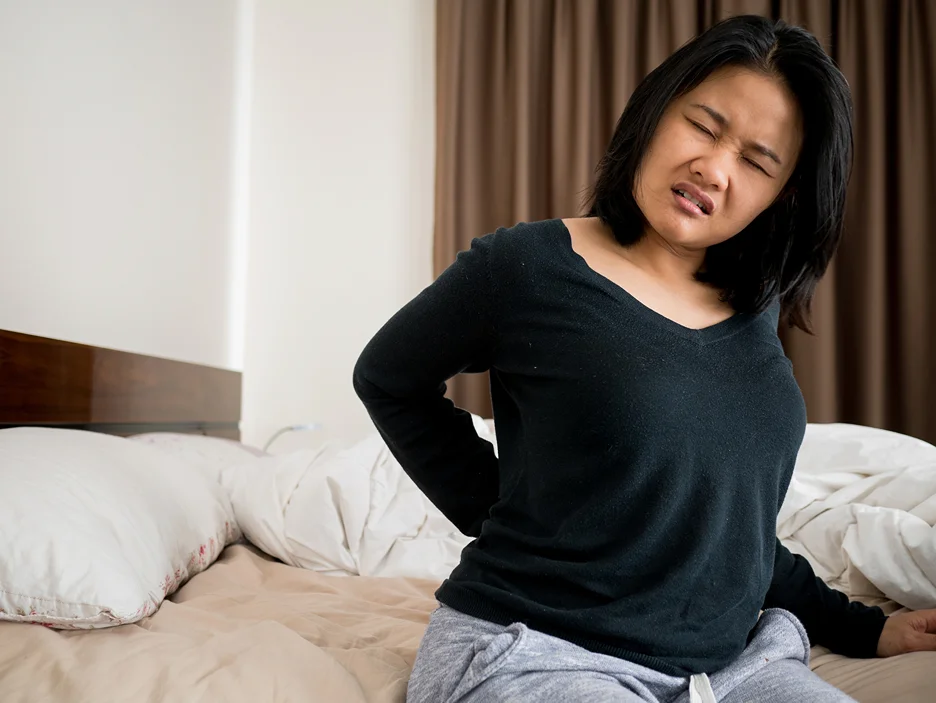Back pain afflicts millions of adults on a daily basis. While muscle strains and poor posture often cause back aches, pain in this area can sometimes indicate an underlying medical issue. If you’re experiencing back pain along with other symptoms like fever, nausea, and abdominal pain, the cause may be a kidney infection.
Kidney infections, also called pyelonephritis, are a result of bacteria entering the urinary tract and multiplying in the kidneys. This leads to inflammation and swelling that can put pressure on the surrounding muscles of the back. Back pain is one of the most common symptoms of a kidney infection.
At Kaly, we specialize in back pain management and want to empower you with information. In this post, we’ll explore the connection between back pain and kidney infections – from where the pain is located to how long it lasts. Keep reading to learn more about how to identify if your back pain may be kidney-related.
Is back pain a common symptom of kidney infection?

Back pain is very common in kidney infections, experienced by most patients. It’s one of the earliest signs, and often the most noticeable and debilitating symptom. The pain stems from the swelling and inflammation of the kidneys as the infection grows.
How does back pain from a kidney infection typically feel like?
The character of the pain can help distinguish it from regular back pain:
- Location – usually in the sides, upper back, and flank area
- Severity – ranges from mild ache to acute throbbing
- Type – feels like muscular pain or spasms rather than sore joints/discs
- Onset – comes on suddenly and worsens rapidly
- Pattern – constant, non-stop pain rather than intermittent
Can the severity of back pain indicate the seriousness of a kidney infection?
Yes, more severe back pain often correlates with a more advanced kidney infection. Mild discomfort may signal an infection in its early stages, while intense and debilitating pain likely means the bacteria has proliferated and spread further through the urinary tract. However, some minor infections can still cause acute back pain.
Can upper back pain be a symptom of a kidney infection?
Absolutely. While kidney infections classically cause pain in the lower back or flanks, it’s not unusual for the pain to radiate upwards. Referred pain signals from the inflamed kidneys can make the muscles in the upper back spasm and ache.
Where is the back pain typically located in cases of kidney infection?
The pain localizes in the flank area of the back, just above the hips and on the sides where the kidneys lie. It can be on one or both sides, depending on if one or both kidneys are infected. The pain may also wrap around to the abdominal area. Referred pain can radiate to the upper back and spine region too.
Can back pain be the only symptom presented in a kidney infection?
In rare cases, yes – some individuals may only experience back pain without other typical kidney infection symptoms. This is called atypical or occult kidney infection. However, most patients have additional signs like fever, chills, frequent urination, abdominal pain, nausea, or vomiting. Anyone with isolated unexplained back pain should get evaluated for a possible kidney infection.
What is the average duration of back pain caused by a kidney infection?
On average, back pain from a kidney infection lasts between 3 days to 1 week if treated promptly with antibiotics. The pain may come and go as the infection waxes and wanes. Without treatment, severe back pain can persist for weeks or longer as the bacteria multiply unchecked. Early diagnosis and antibiotics are key to relieving the back pain quickly.
Are there cases of kidney infections without back pain as a symptom?
While uncommon, it’s possible to have a kidney infection without noticeable back pain. This occurs in around one-third of kidney infection cases. Factors like the location of the infection, pain tolerance, and individual variability in symptom presentation can influence whether back pain manifests. You should watch for other common signs like fever, chills, nausea, and urinary symptoms even without back pain.
What biological processes cause back pain in kidney infection symptoms?
When bacteria infect the kidneys, the resulting inflammation irritates the kidney tissues and renal capsule. This activates nociceptors – pain receptors that transmit signals via the spinal nerves to the central nervous system. The brain perceives this as pain or discomfort in the flank, side, and back region.
In addition, the swelling and pressure on the kidneys can cause muscle spasms and stiffness in surrounding areas like the lower back. The infected kidneys may also leak bacteria and toxins into the bloodstream to cause systemic effects like fever, fatigue, and generalized aches.
Are UTI symptoms, including back pain, similar to those of a kidney infection?
There is significant overlap between the symptoms of a lower urinary tract infection (UTI) and kidney infection. Both can cause painful urination, frequent urination, fever and back pain. But a kidney infection’s symptoms are generally more severe, with high fevers and intense, constant flank and back pain. Nausea and vomiting are also more common with kidney involvement.
Can a kidney infection cause both stomach and back pain simultaneously?
Yes, it’s common to have concurrent abdominal and back pain with a kidney infection. The abdominal discomfort results from the inflammation spreading from the kidney to adjacent areas. The stomach and intestines may become irritated, causing digestive upset.
How can one determine if lower back pain is a symptom of a kidney infection?
Lower back can result from various conditions, but these tips can help attribute it to a possible kidney infection:
- Pain in flank area that may wrap around to lower back
- Urinary symptoms like burning pee, frequent urination
- Fever, chills, nausea, vomiting
- Pain comes on rapidly and is constant, severe
- Pain worsens from pressure/movement
- Pain unaffected by position changes or analgesics
- Recent UTI or previous kidney infections
When back pain shows up with these red flags, it’s worth getting checked for kidney infection. A simple urine test and physical exam can confirm the diagnosis.
Can back pain from a kidney infection persist for weeks?
Left untreated, yes. Back pain from kidney infections can linger for weeks or longer as the bacteria proliferate and the kidneys sustain damage. The pain may fluctuate in intensity but doesn’t fully resolve without antibiotics.
With prompt treatment though, the back pain usually improves within 3 to 7 days as the infection clears. Seeking early medical care is key to preventing protracted, severe back pain.
When in Doubt, Check it Out

If you are battling with mysterious back pain accompanied by worrying systemic symptoms, don’t hesitate to get yourself checked by a doctor. A simple urine test and physical examination of your back and abdomen can reveal if a kidney infection is brewing.
As you can see, back pain can be a pivotal symptom when it comes to diagnosing kidney infections. While it may also result from a myriad of other causes, new onset back pain accompanied by urinary symptoms, abdominal pain, fever, nausea, or vomiting warrants an evaluation for kidney infection.
At Kaly, we know how debilitating back pain can be. Our mission is to empower back pain sufferers with the knowledge to improve their lives. We hope this article helped shed light on the kidney infection-back pain connection. Remember, you don’t have to suffer in silence. Reach out to us anytime for resources and support to find solutions for your back pain.
